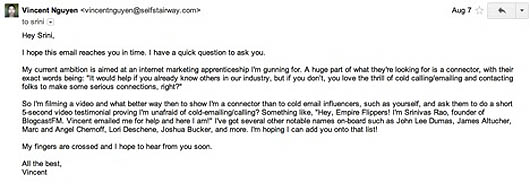Success Advice
6 Valuable Lessons a 19-Year Old Learned from Reaching Out To Millionaires
This valuable advice is shared by a young aspiring entrepreneur by the name of “Vincent Nguyen“.
Through his successful experience Vincent will teach you how to contact millionaires and highly influential people to take your ventures and ideas to the next level.
How To Successfully Network With Entrepreneurs & Millionaires
Just a month ago, I saw the greatest opportunity in my life present itself.
It was linked in a tweet, strangely enough. Sean Ogle changed my life with a simple tweet.

When I read through the entire page I only had one reaction.
Holy crap!
There was a company based in the Philippines that was offering an apprenticeship that would make my life. The work itself sounded fun and I felt qualified enough to go after it, but what caught my attention were the extra side-benefits.
The person who was chosen would be able to move to the Philippines for the first 6-months. Cool, everyone likes to travel. No big deal right?
There’s more. These guys were going to pay for pretty much all of my expenses while I’m there. Housing, bills, food, and maids. Everything. They didn’t cheap out either because it’s a huge house.
On top of all that, I’d be getting paid for my time there along with the chance to earn even more and work with them full-time if all goes well.
As a 19-year old who has been working in their niche for less than a year, I felt like I’d be buried by the competition. There has to be thousands of people who saw this and wanted it. I was sure they’re more qualified than me.
I almost ignored it. I almost listened to my own excuses, but I couldn’t let this slip past me without a fight.
I studied what they were looking for in a candidate and started wondering if there was something I could do to blow them away.

“You’re going to be reaching out to a ton of people.”
There it is. My opening. That’s what I’m going to leverage for my application.
I felt like I was getting hotter and hotter. Maybe it’s because I was getting excited or someone lit a light bulb above my head like in the cartoons. I don’t know. All I knew was that I had an idea that would grab their attention right from the start.
They wanted a connector. What better way to prove I am one than to take advantage of the mandatory video they wanted alongside the written application?
I made a long list of 40-50 successful entrepreneurs, authors, and internet marketers I could reach out to for help.

I cold-emailed Michael Hyatt, John Saddington, Neil Patel, Rand Fishkin, and several others, asking them to record a short video testimonial for me. All I asked of them was to record themselves, say their name and something along the lines of “Vincent reached out and connected.”
The challenge was that most of these people have never heard of me.
Why would they care to do me a favor?
The Result?
Out of 47 people, 16 agreed and sent me their video. That’s almost 40%! The rest either wished me best of luck or didn’t reply, but nearly half said yes!
When I turned in the video to the marketing company, they were floored. In fact, they loved it so much that they had shared it among their secret circle of entrepreneurial buddies. My chances were looking really good.
Thanks to this creative journey, I ended up befriending a few of the entrepreneurs I reached out to.
None of this would have happened if I bought into my own excuses. I was telling myself things like they don’t know my name. I’m too young. No one would take me seriously. What if I look like an idiot?
The list went on for miles. I could have just moved on and told myself that nothing could come of it, but I went for it. I got famous influencers to vouch for me and the company is telling me my chances are looking good. The Philippines is becoming something that can be a part of my life for the next year.
Most importantly of all, I learned several valuable lessons from this that provided insight into how other people worked.
1. Rejection doesn’t take anything from you.
In a lot of cases, the worst that could happen is that you don’t get what you wanted. No one comes and collects the things you love then locks them away. You don’t lose anything.
At least when you get outside your comfort zone and make a leap of faith, you give yourself a fighting chance. If you don’t try at all you’ll end up failing anyway and you’re stuck where you were by default.
2. People are more willing to help than you think.
When I first had the idea to reach out, I was scared. I thought for sure I’d get a 0% response rate. After all, who am I to just email someone like Michael Hyatt and ask for help?
I didn’t tell him what I did, where I’m from, or anything that would woo him. I politely told him the situation, how much it’d mean to me, and that’s all. He was more than happy to get in front of a camera to do this and that’s what amazes me. Michael, along with 15 others, took time out of their day to help someone they didn’t know.
3. When you’re genuine, people will want to help you.
You don’t always have to offer something in return to get help. I didn’t swap favors or promise to pay them back in the future. That’s sleazy. People see right through that sort of exchange.
Instead, I was honest and transparent. I didn’t hide anything at all. Everyone I emailed knew that I was the only one to benefit from this and I knew it too. Why hide behind a thin veil?
4. You can connect with anyone.
Sure, a few people ignored my request, but that’s okay. The fact that nearly half got back to me means a lot and should inspire you to get in touch with a person that you look up to.
There are some people who are more difficult to get ahold of, but that doesn’t put them out of the realm of possibility. I didn’t reach out to Obama or anything, but there are ways.
5. Creativity has more definitions than one.
I used to think I wasn’t creative just because I didn’t know how to draw, paint, or do anything artistic. I equated creativity with art and determined that I wasn’t creative.
But creativity is the ability to do things differently that others haven’t thought of before. It doesn’t always come from a whim. Instead, you have to be intentional and brainstorm ideas. It will get you noticed and is worth the effort.
Don’t count yourself out. You’re probably more creative than you give yourself credit for.
6. Taking action is far better than getting stuck wondering what could have been.
So the next time you see an opportunity come by and you start believing your own lies, remember what could happen. Remember that you can put 100% into what you want.
Even though the final decision hasn’t been made yet, I learned a lot through this whole process.
What’s the worst that could happen when you decide to go all in?
Business
If Your Business Internet Keeps Letting You Down, Read This
From smoother operations to better security, dedicated internet access is quietly powering today’s high-performing businesses.

Today, a dependable internet service is the bedrock for uninterrupted business operations. Many organizations rely on stable online connections for communication, data transfer, and customer interaction. (more…)
Did You Know
How Skilled Migrants Are Building Successful Careers After Moving Countries
Behind every successful skilled migrant career is a mix of resilience, strategy, and navigating systems built for locals.

Moving to a new country for work is exciting, but it can also be unnerving. Skilled migrants leave behind familiar systems, networks, and support to pursue better job opportunities and a better future for their families. (more…)
Life
10 Research-Backed Steps to Create Real Change This New Year
This New Year could finally be the one where you break old patterns and create real, lasting change.

Every New Year, we make plans and set goals, but often repeat old patterns. (more…)
Change Your Mindset
The Silent Skill That Makes People Respect You Instantly
What truly earns respect and why most people go about it the wrong way

Everybody craves respect but not everyone earns it. Some people believe that a title, years of experience, or a position of authority automatically entitles them to respect. (more…)
-

 Did You Know4 weeks ago
Did You Know4 weeks agoHow Skilled Migrants Are Building Successful Careers After Moving Countries
-

 Health & Fitness3 days ago
Health & Fitness3 days agoWhat Minimalism Actually Means for Your Wellness Choices
-

 Business3 days ago
Business3 days agoIf Your Business Internet Keeps Letting You Down, Read This
-

 Did You Know2 days ago
Did You Know2 days agoWhy Most Online Courses Fail and How to Fix Them


























59 Comments